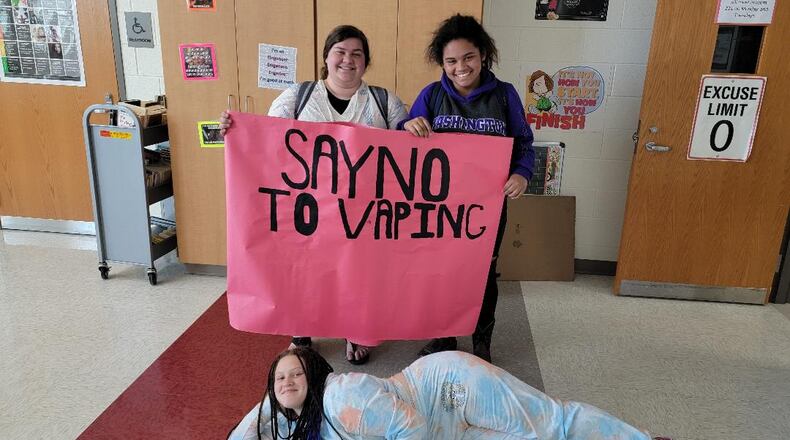After a year that saw the school’s Students Against Destructive Decisions (SADD) program take on teen issues including distracted driving, drinking and driving and texting and driving, the spring weeks focused on vaping. The SADD program students got a large banner and invited their peers to sign it as a pledge not to use vaping products, promoted by the Clark County Combined Health District (CCCHD), which obtained the grant, along with flyers and reminders spread throughout the school.
“The objective came from looking at studies with successful messaging with teens,” said Leah Behler, tobacco prevention and cessation health planner with the CCCHD. “The vaping industry mimics vapes to taste like candy flavors and uses social media influencers and they can become addicted and be solidified as long-term consumers. Teens don’t like to be taken advantage of.”
Behler said vaping has been normalized, from peers to people in students’ homes using, making it seem as if it takes the harm out of it. It’s popular because it looks cool, and the boom market is those ages 18-24.
“Nicotine dependence doesn’t look cool,” she said.
School Resource Officer Deputy William Crump is kept busy around Northwestern, estimating half of the behavior offenses come from vaping – if they are caught. The school, along with others in the county, has vape detectors in the restrooms to catch student vaping, but even these have limitations.
“They’re not dumb. You get 15 kids in a bathroom at a time and the detectors can be defective and have false positives,” Crump said.
SADD advisor Lynn Cochran said one of the misconceptions she’s heard from students is vaping isn’t as harmful as cigarettes, that girls like them because of the taste and some parents are misinformed, saying their kids could be doing worse things.
Young people who have used told Cochran and Crump that vapes calm their nerves and produce less anxiety. Behler that counters smoke is harmful, whether it’s from cigarettes or vapes if it goes in your lungs.
Another distressing sign Crump has discovered is young people are starting vaping earlier. Not just middle schoolers, but elementary students and, the most shocking, a kindergartner was caught with a vape.
“By the time you get to high school, it’s more about prevention, so we have to start earlier,” said Behler.
Crump has discovered students hide the vapes up their sleeves, in hoodies or even disguise them as USBs. Crump said it isn’t reflective of Northwestern’s overall student body.
“We have really good kids here,” he said.
This is where the Banner Project differed it was peer to peer. SADD students encouraged their peers during lunch to sign the banner pledging not to vape, passed out flyers and informed them of vaping’s effects, information to help quit.
While there is no data on which if any students called, Cochran said if just one called it was a success. She’d like to see the school do the Banner Project again, and Crump wants to start educating the younger students.
Behler said finding healthy alternatives such as exercising, listening to music, hanging out with friends who don’t vape are ways can curb the temptations. Or they can seek out teachers, counselors or resource officers.
Crump said it’s not about the punishment but finding an alternative and would be harsh to suspend or put them in juvenile detention.
“If we could do it at the beginning of school it would be in the forefront and do more education in health classes,” Cochran said. “It has been a great activity in the ways to have student educate their peers rather than an adult was key.”
About the Author
